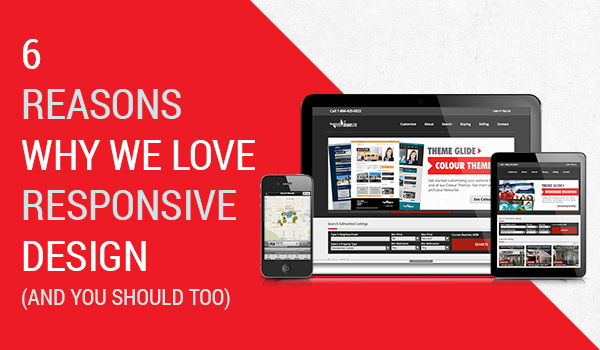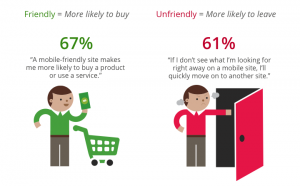Responsive design has been de rigeur for over a year, now. Mashable called 2013 The Year of Responsive Design to coincide with what it believed would be the year that mobile devices outsold desktop PCs. They may have been right about mobile sales, but even if 2013 was to be that year, responsive design wasn’t to become as ubiquitous as they had hoped. And in 2014, entire industries still haven’t moved ahead with responsive web design. The real estate industry has gaps in this area, too, but there may be ways to make this an advantage for you.
What is responsive design?
Responsive design is different from previous website design approaches. Whereas websites used to have fixed widths, grids and image sizes, responsive design is fluid—using media queries that ask the web browser (your desktop, tablet or phone) the resolution (size and orientation) it wants to see things. In fact, if you are on a desktop device and you open a website that uses responsive design, you can alter the size of the browser window, and the website will alter its layout and image size as you reduce or enlarge viewing area. Try resizing this responsive house icon.
Responsive design, like our Pro and Custom levels, have big advantages over websites made using previous methods, some of which can be game changers for REALTORS®. Here are our top six reasons why responsive design will continue to matter for Real Estate websites.
Tablets and Mobile Ubiquity
As of March of this year, 55% of the Canadian population was using mobile devices regularly. That means that more than one of every two Canadians has a smartphone. Also, one in four Canadians browse and shop on their tablets, suggesting that they have integrated into everyday life; the digital marketplace is showing signs of maturity in this country.
The implications for this are significant. Integrated users of mobile devices use them for more key decisions than ever. From banking to financial planning, taking credit payments and making purchases, mobile use in Canada is key. Web marketers in some verticals have gotten wise to this, but there is still space for savvy REALTORS® to get ahead with help from responsive web design. We’ve made it easier to appeal to these markets, but we’ll talk about that later.
In search, Google and Bing use bots to ‘crawl’ or index your website pages, and these gather information about what you offer, who you are and how authoritative your website is. It’s important to make things as easy as possible for this to happen, as slowing down web crawlers can have negative effects on your search results. In the days before responsive design, designers and developers would have to architect unique SEO campaigns for each site separately for each type of site that was created. A mobile-optimized site would use different content moving through a unique stream to different customers than a desktop or even a tablet-optimized site. This quickly became a not-so-cost-effective means of running a company’s online marketing. With the maturity of online marketing, responsive design became a worthwhile investment. Recently, Google began advancing the course of responsive web design as a search- and user-friendly approach. Google has been very supportive of the transition to responsive design, and they publicly said so. As the worldwide upgrade plays on, the advantage for adopting responsive design is likely to last for some time.
User Experience
People enjoy having similar experiences when they do things. McDonald’s serves much the same burger in Canada as it does in the US. That user experience consistency helps it maintain competitive advantage over its competitors. It’s safe to say that customer experiences on the internet are similar, and the numbers suggest it. A recent survey found that 65% of customers said they would be more likely to buy on a familiar mobile-friendly website than they would on one that was only desktop optimized. In fact, if they were to find a non-mobile friendly site, 61% would happily move on to a friendlier site.
Also, we know that different devices use different screen sizes—think the Sony Viaio versus Samsung Galaxy Tablet versus the Apple iPad. Remember that responsive design works using queries, meaning that one site adapts itself to meet the requirements of each individual device. The oldest methods of design would require that the website keeps to the desktop design and user experience goes out the window. Early adopters suffered for years through this era, and now that we have successful solutions, there is no excuse for putting people through such pains. In fact, it can be dangerous to do so.
 Conversions
Conversions
Another thing about those glorious early adopters to mobile devices, buying just about anything online was a headache. Few sites optimized themselves for mobile user experiences, leaving potential customers no choice but to keep trying elsewhere. This frustration has continued to today, except the numbers of frustrated browsers and prospects are bigger, making the stakes even higher than they used to be.
Responsive design enables real estate websites to have a user-friendly experience that doesn’t change. The device and layout may change, but the experience is retained and the customer can move forward in their decision-making. Here are some great examples of retailers and the effects of responsive design.
For real estate websites, conversions are critical. It would be easy for a visitor to experience a non-optimized website, get frustrated and move on to a competitor. Multiply this factor, and that real estate website has become a lead loser—an MVP for your competition. Responsive design websites retain your prospects by providing a consistent, easy experience, allowing them to search your properties, learn about your team and get in touch without having to resize the view every time they want to click a button.
Put simply, responsive design is an investment that offers great returns:
- Better leads
- Reliable customer experience
- Search engine optimization
- Potential edge over the competition
Responsive design for real estate websites is an option worth very serious consideration. If you are not already using a responsive website design, get in touch with us. We’d be happy to show you how much of a difference it could make in your business.
Sign-up For FREE Updates



